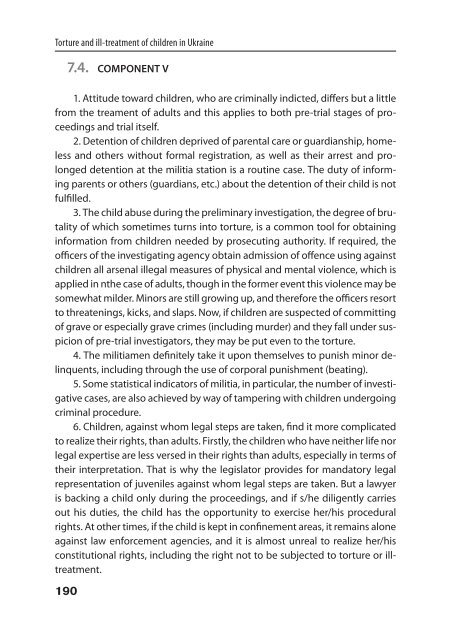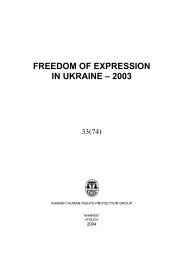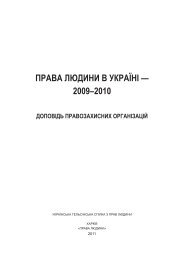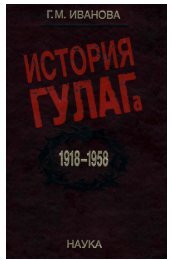TORTURE AND ILL-TREATMENT OF CHILDREN IN UKRAINE
TORTURE AND ILL-TREATMENT OF CHILDREN IN UKRAINE
TORTURE AND ILL-TREATMENT OF CHILDREN IN UKRAINE
- No tags were found...
You also want an ePaper? Increase the reach of your titles
YUMPU automatically turns print PDFs into web optimized ePapers that Google loves.
Torture and ill-treatment of children in Ukraine1907.4. Component V1. Attitude toward children, who are criminally indicted, differs but a littlefrom the treament of adults and this applies to both pre-trial stages of proceedingsand trial itself.2. Detention of children deprived of parental care or guardianship, homelessand others without formal registration, as well as their arrest and prolongeddetention at the militia station is a routine case. The duty of informingparents or others (guardians, etc.) about the detention of their child is notfulfilled.3. The child abuse during the preliminary investigation, the degree of brutalityof which sometimes turns into torture, is a common tool for obtaininginformation from children needed by prosecuting authority. If required, theofficers of the investigating agency obtain admission of offence using againstchildren all arsenal illegal measures of physical and mental violence, which isapplied in nthe case of adults, though in the former event this violence may besomewhat milder. Minors are still growing up, and therefore the officers resortto threatenings, kicks, and slaps. Now, if children are suspected of committingof grave or especially grave crimes (including murder) and they fall under suspicionof pre-trial investigators, they may be put even to the torture.4. The militiamen definitely take it upon themselves to punish minor delinquents,including through the use of corporal punishment (beating).5. Some statistical indicators of militia, in particular, the number of investigativecases, are also achieved by way of tampering with children undergoingcriminal procedure.6. Children, against whom legal steps are taken, find it more complicatedto realize their rights, than adults. Firstly, the children who have neither life norlegal expertise are less versed in their rights than adults, especially in terms oftheir interpretation. That is why the legislator provides for mandatory legalrepresentation of juveniles against whom legal steps are taken. But a lawyeris backing a child only during the proceedings, and if s/he diligently carriesout his duties, the child has the opportunity to exercise her/his proceduralrights. At other times, if the child is kept in confinement areas, it remains aloneagainst law enforcement agencies, and it is almost unreal to realize her/hisconstitutional rights, including the right not to be subjected to torture or illtreatment.
















